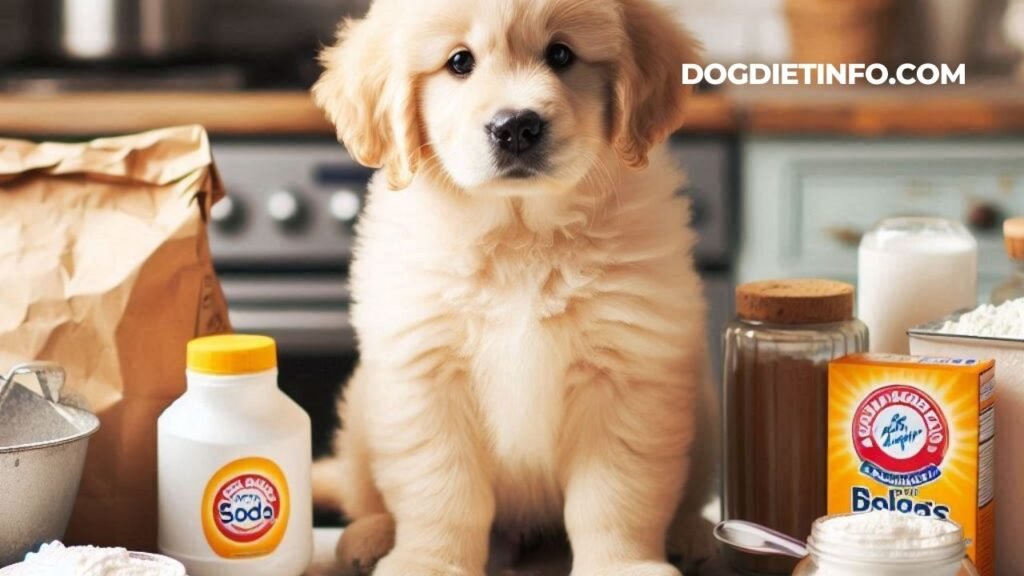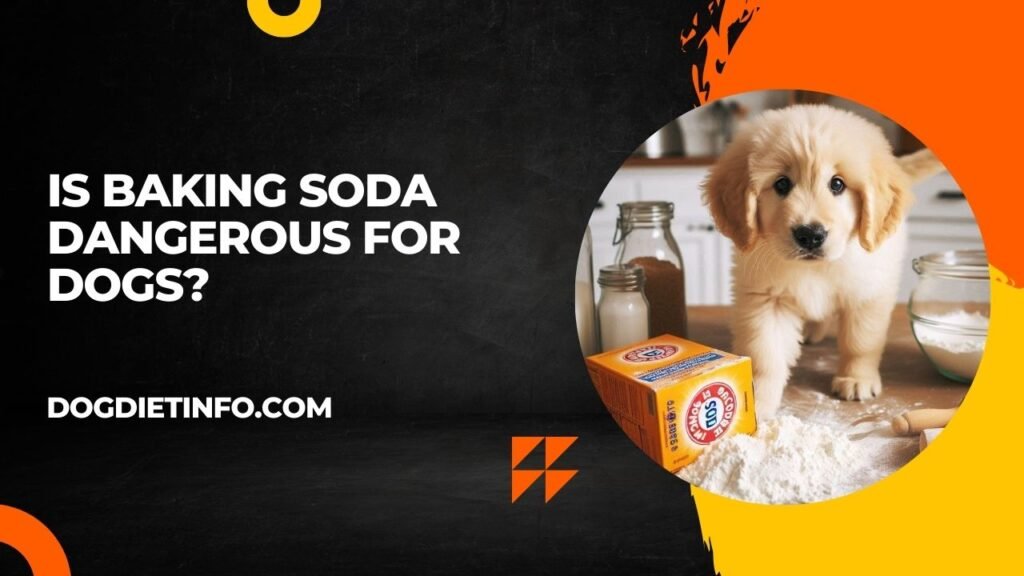Is Baking Soda Dangerous For Dogs? Baking soda can be harmful to dogs if ingested in large amounts, leading to symptoms like vomiting, diarrhea, and electrolyte imbalances.
Baking soda is a staple in most households, known for its versatile uses in cooking, cleaning, and deodorizing. However, when it comes to our furry companions, what is safe for humans isn’t always safe for them.
Many pet owners wonder, “Is baking soda dangerous for dogs?” This question is particularly important as baking soda is commonly used for neutralizing pet odors, cleaning carpets, and even in some homemade pet grooming products.
In this comprehensive blog post, we will explore the potential dangers of baking soda for dogs, the symptoms of toxicity, safe usage guidelines, and alternatives to ensure your pet’s safety.
Contents
- 1 What Is Baking Soda?
- 2 Can Baking Soda Be Dangerous for Dogs?
- 3 Signs of Baking Soda Poisoning in Dogs
- 4 What to Do If Your Dog Ingests Baking Soda
- 5 How to Safely Use Baking Soda Around Dogs
- 6 Understanding Baking Soda in Pet Grooming
- 7 Final Verdict
- 8 FAQs
- 9 Conclusion: Is Baking Soda Dangerous For Dogs?
What Is Baking Soda?
Definition and Composition:
Baking soda, scientifically known as sodium bicarbonate, is a white, crystalline powder that serves as a versatile ingredient in households.
It is a mild alkali that helps neutralize acids and breaks down proteins, making it useful in baking as a leavening agent. [Is Baking Soda Dangerous For Dogs?]
When it reacts with an acid, like vinegar or lemon juice, it releases carbon dioxide gas, which causes dough to rise and become light and fluffy.
Why Baking Soda Is Popular:
Aside from its culinary uses, baking soda has been celebrated for its cleaning and deodorizing properties.
It is often used to scrub surfaces, remove stains, and neutralize odors in the home. Due to its mild abrasiveness and natural composition, many pet owners consider it a safer alternative to harsh chemical cleaners.
Baking soda is also a common ingredient in homemade toothpastes, deodorants, and even pet grooming shampoos. However, its safety in relation to pets, particularly dogs, needs careful consideration.
Can Baking Soda Be Dangerous for Dogs?
Ingestion Risks:
While baking soda is not toxic in small amounts, it can become dangerous when ingested in larger quantities. [Is Baking Soda Dangerous For Dogs?]
Sodium bicarbonate, when ingested, can cause an electrolyte imbalance in dogs due to its sodium content.
Ingesting a small amount might not immediately result in toxicity, but consuming a larger quantity can lead to serious health issues, particularly in smaller dogs or those with pre-existing health conditions.
The primary concern is the alkaline nature of baking soda, which can upset the delicate pH balance in a dog’s stomach and digestive system.
Symptoms of baking soda toxicity include vomiting, diarrhea, excessive thirst, lethargy, and even seizures. If not treated promptly, severe cases can lead to muscle spasms, tremors, or even death.
Safe Usage in Small Amounts:
When used in very small amounts and in a controlled manner, baking soda can be relatively safe. [Is Baking Soda Dangerous For Dogs?]
For instance, some pet owners use baking soda as a natural deodorizer for pet beds or to sprinkle lightly on carpets before vacuuming.
However, it is crucial to ensure that your dog does not ingest it. Even a small amount of baking soda should be kept out of reach of curious pets.
Always consult with your veterinarian before using any homemade grooming or cleaning products that contain baking soda.

Signs of Baking Soda Poisoning in Dogs
It is vital to recognize the signs of baking soda poisoning to provide timely and appropriate care for your dog. [Is Baking Soda Dangerous For Dogs?]
Symptoms can vary depending on the amount ingested and the size and health status of the dog. The following are the primary symptoms to watch for:
Gastrointestinal Symptoms:
- Vomiting: One of the most common signs of ingestion, as the dog’s body attempts to expel the toxic substance.
- Diarrhea: This may occur as the digestive system becomes irritated.
- Excessive Drooling: An indication of nausea and discomfort. [Is Baking Soda Dangerous For Dogs?]
- Abdominal Pain and Discomfort: Your dog may exhibit restlessness, whining, or unusual postures.
Neurological Symptoms:
- Tremors or Muscle Spasms: These may indicate a more severe reaction affecting the dog’s nervous system.
- Seizures: A sign of acute toxicity and electrolyte imbalance. [Is Baking Soda Dangerous For Dogs?]
- Uncoordinated Movements: Dogs may stagger or seem disoriented.
Electrolyte Imbalances:
Baking soda’s high sodium content can cause electrolyte imbalances, which may lead to symptoms such as increased thirst, confusion, lethargy, and, in severe cases, coma. [Is Baking Soda Dangerous For Dogs?]
Dogs with existing heart, kidney, or liver conditions are particularly susceptible to these effects and should be kept away from all potential sources of baking soda.
What to Do If Your Dog Ingests Baking Soda
Immediate Steps:
If you suspect your dog has ingested baking soda, it is essential to act quickly. Start by removing any remaining baking soda from their vicinity to prevent further ingestion. Check your dog’s mouth and remove any visible powder or remnants.
Next, contact your veterinarian or an emergency animal poison control hotline for advice. It is crucial not to induce vomiting unless specifically directed by a veterinary professional, as this could cause further harm.
When to Seek Emergency Help:
Seek immediate veterinary attention if your dog shows any of the following symptoms after ingesting baking soda:
- Severe vomiting or diarrhea that persists for more than a few hours.
- Muscle tremors or seizures, which indicate serious neurological involvement.
- Difficulty breathing or rapid, shallow breaths.
- Lethargy or unconsciousness, suggesting a severe systemic reaction.
Veterinary Treatment Options:
Treatment for baking soda poisoning may involve inducing vomiting, administering activated charcoal to bind the toxin, and providing IV fluids to restore electrolyte balance and hydration.
In severe cases, medications to control seizures or muscle spasms may be required. Prompt veterinary care can make a significant difference in recovery outcomes.
How to Safely Use Baking Soda Around Dogs
Cleaning and Deodorizing Tips:
If you choose to use baking soda around the house, follow these safety guidelines to minimize risks:
- Keep Dogs Away During Application: Ensure that your dog is not present when applying or cleaning up baking soda. Let treated areas dry completely or vacuum thoroughly to remove any residue.
- Store Baking Soda Securely: Keep baking soda stored in a secure, dog-proof cabinet to prevent accidental ingestion. [Is Baking Soda Dangerous For Dogs?]
- Use in Well-Ventilated Areas: This will help reduce the chances of your dog inhaling any fine particles that might be released during cleaning.
Safe Applications for Baking Soda:
- Deodorizing Carpets: Sprinkle baking soda lightly on carpets, wait for 15 minutes, and vacuum thoroughly. Ensure no residue remains on the carpet.
- Cleaning Pet Beds: Add a small amount of baking soda to the washing machine when cleaning pet bedding. Make sure to rinse thoroughly to remove all traces.
- Bathing Dogs: A small amount of baking soda can be used in bathwater for dogs with skin conditions, but consult your vet first and prevent your dog from drinking the bathwater.
Alternative Pet-Safe Products:
For pet owners who prefer to avoid baking soda altogether, several pet-safe alternatives are available:
- Enzymatic Cleaners: These are effective at breaking down stains and odors without harmful chemicals. They are specifically designed for pet messes and are safe for use around dogs.
- Vinegar Solutions: A mixture of vinegar and water can be used as a natural cleaner and deodorizer. While dogs might not love the smell, vinegar is generally safe for them.
- Commercial Pet-Safe Cleaners: There are many cleaning products available that are certified safe for pets and just as effective as baking soda for odor control and stain removal.
Understanding Baking Soda in Pet Grooming
Some pet owners use baking soda as a natural grooming product, such as a dry shampoo or in toothpaste. However, caution should be exercised with such uses:
- Dry Shampoo: While baking soda can absorb excess oil and neutralize odors, it should be used sparingly. Ensure it is thoroughly brushed out afterward to prevent ingestion.
- Toothpaste: Homemade pet toothpaste with baking soda is not recommended. Dogs may swallow more than they spit out, leading to ingestion and potential toxicity.
Final Verdict
Baking soda can offer many benefits as a natural cleaner and deodorizer, but it can be dangerous for dogs if ingested in significant amounts.
Understanding the risks and using baking soda cautiously around your home can help prevent potential poisoning. [Is Baking Soda Dangerous For Dogs?]
Pet-safe alternatives are also available for those who wish to eliminate any risk. Always keep your dog’s safety in mind, store baking soda securely, and consult your veterinarian for advice on using any household products around your pets.
See Also: Are Yak Chews Safe For Dogs?
FAQs
Can I use baking soda to clean my dog’s bed?
Yes, baking soda can be used to clean a dog’s bed, but it is crucial to vacuum or thoroughly rinse off any residue to prevent ingestion.
How much baking soda is toxic to dogs?
Even a small amount can be harmful depending on the dog’s size. Generally, one teaspoon per pound of body weight can be toxic, so it’s essential to use caution.
Is baking soda safe to use on my dog’s skin?
In small, diluted amounts, baking soda can help neutralize odors on the skin. However, avoid allowing your dog to lick or ingest it, and always consult your vet before use.
What should I do if my dog licks a small amount of baking soda?
Monitor your dog closely for any signs of distress or poisoning. If any symptoms develop, contact your veterinarian immediately.
Are there any pet-safe alternatives to baking soda?
Yes, there are several pet-safe alternatives, such as enzymatic cleaners, vinegar solutions, and commercial pet-safe cleaning products that effectively neutralize odors and stains without the risks associated with baking soda.
Conclusion: Is Baking Soda Dangerous For Dogs?
Understanding the potential risks of baking soda to dogs is crucial for every pet owner. While it is a useful and natural product for humans, it requires careful handling around pets.
When used wisely and in moderation, you can maintain a clean home environment and keep your furry friends safe.
Always err on the side of caution and prioritize your dog’s health and well-being above convenience. [Is Baking Soda Dangerous For Dogs?]

Derrick Wilcox is a certified canine behaviorist with over 12 years of experience at Happy Paws Animal Clinic and Pawsitive Training Center, helping pet owners ensure safer, healthier, and happier lives for their dogs.



